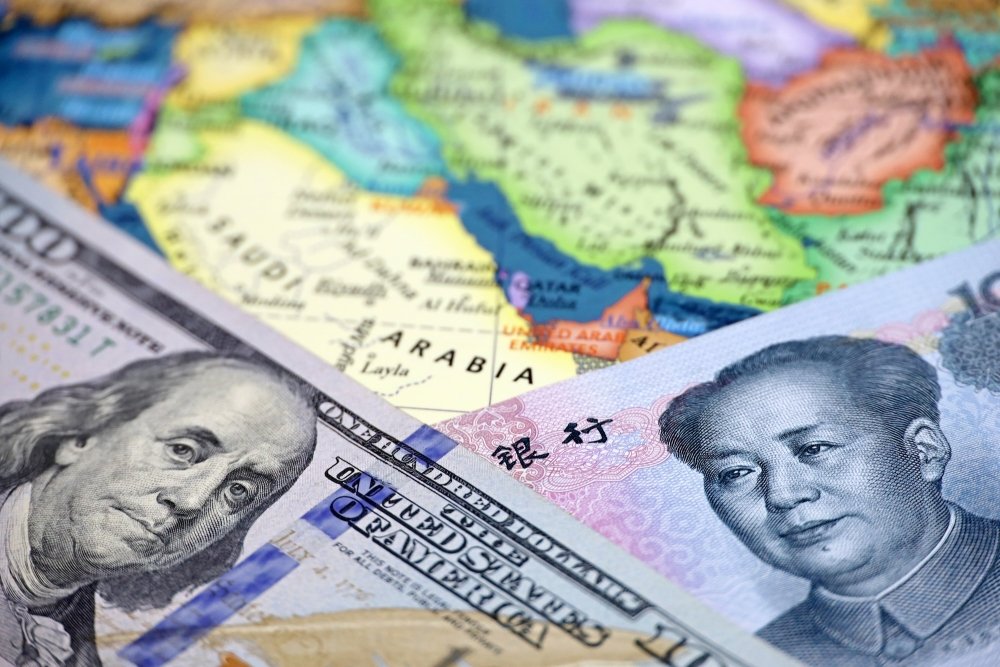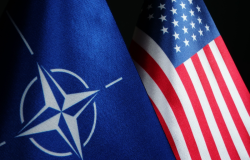China Exploits the "War on Gaza" in its Power Struggle with Washington
China is actively staking a position in the Gaza war to bolster its relations with Arab and Islamic States. Beijing may seek to exploit Washington’s distractions in the Middle East, but an expanding conflict may also harm its strategic interests.

shutterstock.com/Oleg Elkov
China refrained from condemning Hamas’ October 7 attacks, yet it labeled the Israeli response as "collective punishment against civilians", attempting to maintain a delicate balance, and "position itself as a mediator while exercising its influence in the region," according to Dr Maria Papageorgiou, Lecturer in Politics and International Relations at the University of Exeter and researcher Mohammad Eslami at Minho University.
In a joint email, the researchers said "China's engagement in the Middle East is set to intensify during this conflict", adding that "Beijing will play an enhanced role in efforts to end the war… and capitalize on the Arab states’ frustration with Washington, establishing itself as a major player in the region.
A Political legacy
Operation Al-Aqsa Flood came ahead of a scheduled visit by Israeli Prime Minister Benjamin Netanyahu to Beijing late October 2023. China had previously hosted Palestinian President Mahmoud Abbas in June, in efforts to mollify its role in the region. China, according to its former Foreign Minister Qin Gang, is ready to "facilitate peace talks to resolve the long-standing Israeli-Palestinian conflict," which Beijing describes as at the"heart of the Middle East."
Resolving the Palestinian issue and achieving a two-state solution were key criteria for justice and fairness in the Middle East in China's 2021 large-scale international conference to achieve security and stability in the Middle East.
To understand China's stance, one must return to the 1950s, the beginning of Beijing's engagement with the Palestinian cause. Then Chinese Foreign Minister Zhou Enlai made persistent efforts to include the Palestinian issue on the agenda of Bandung's Afro-Asian Conference in 1955.
According to Zhou, China stands "with all Arab causes in general, and the Palestinian cause in particular," because it supports "the struggles of oppressed peoples." China refused to recognize Israel in exchange for its own recognition in 1955, before officially recognizing the PLO in 1965, marking a "unique milestone in international relations" and a "revolutionary development in international law," according to then head of the organization, Ahmed Al-Shukeiri. Still, Israel is China's second-largest arms supplier after Russia.
Chinese experts believe that Washington's heightened interest in strategic arenas outside of East Asia grants Beijing time and room to assert its dominance in the Indo-Pacific region.
Picking low-hanging fruit
Chinese experts believe that Washington's heightened interest in strategic arenas outside of East Asia grants Beijing time and room to assert its dominance in the Indo-Pacific region. According to Ahmad Abudouh, an associate fellow at the Royal Institute of International Affairs, Beijing is pleased to see Washington entangled in Middle East conflicts.
Speaking to the Wilson Center, Ahmad Almaimouni, Director of Studies and Research at the International Institute for Iranian Studies in Riyadh, notes that China shows a "cautious stance on the current crisis in Gaza, balancing its current and future interests." He says, "Washington's increased engagement in the Middle East eases American pressure on China, especially with regard to Taiwan, and imposes new burdens on Washington that serve Beijing’s interests."
By stressing its neutrality on the Gaza War, Beijing aims to "check Washington’s moral standing and internationalize the issue, calling for a global conference to initiate a peace process—thereby removing Washington from its decades-long position as the unchallenged arbiter in the conflict," according to Abudouh. Echoing this sentiment, American researcher on Chinese foreign policy Dawn Murphy says China, together with Washington's relations with Israel, could bring all players to the table," given its positive relations with the Arabs, Palestinians, Turkey and Iran.
"Great tensions hang over China's relationship with bordering nations in the South China Sea, with strong statements against Taiwan and powerful military activities in the region, alongside Beijing's concern about new projects and alliances that it perceives as against it, including the latest Indo-Middle East-European Corridor," as the nucleus of larger projects targeting its Belt and Road Initiative, says historian and international relations specialist Ahmed Dahshan.
Dahshan emphasized: "the prolonged war in Gaza is in Beijing's interest, it undermines the Corridor and the position of Israel as the access point to the Mediterranean Sea. Increased involvement in the war, and its transformation into a conflict, will also preoccupy the West and expose the hypocrisy of its human rights claims. This gives Beijing the diplomatic upper hand, draining its opponents and attracting more Arab, Islamic, African, and Global South nations to its side, while hindering—if not canceling—projects aimed at pitting India against China in geo-political and geo-economic competition."
Missing the tools
Professor Liu Zhongmin at the Middle East Studies Institute at Shanghai International Studies University (SISU), says "the risk of a sixth Middle East war still exists if Israel is engulfed by the desire for revenge, if Hamas finds itself fighting a last-ditch battle, or if more countries are dragged into the war. This danger is higher than many realize."
According to Michael DiMino, a researcher at Defense Priorities and former CIA counterterrorism analyst: "Given the deployment of its military assets in the region, America’s commitment to its allies and partners may lead to intervention, especially if its red lines are crossed, such as Hezbollah entering the war."
China fears the conflict's expansion, according to Almaimouni, would affect "its economic interests, political gains, and relationships in the region," highlighting that "China lacks political power or influence over what's happening in Gaza. While it continues to show political support for ending the war and exposing the West's alleged inhumane bias against the Palestinian people, China bolsters its standing with its partners in Islamic and Middle Eastern nations."
"China certainly has an interest in preventing a direct US-Iranian confrontation, as it is a major oil consumer and that would spike prices," says Jon Alterman, head of the Middle East Program at Washington's Center for Strategic and International Studies (CSIS). Still, "the Chinese are unlikely to do any heavy lifting here", Alterman adds that "they'll want a seat at the table when the Israel-Gaza struggle gets resolved, but they don't feel much need or ability to hasten resolution."
The 'white whale of peacemaking'
Chinese Foreign Ministry spokesperson Mao Ning stated, “As a friend to both Israel and Palestine, what we hope to see is the two countries living together in peace." However, Washington is obstructing Beijing's mediation, describing it as an attempt to position itself as a geopolitical rival to Washington, according to peace activist KJ Noh, who states, "China is using its good offices, scrambling to do shuttle diplomacy to try and de-escalate and find a peaceful resolution."
China is now in a better position than the US to mediate in conflict resolution, whether between Saudi Arabia and Iran, Russia and Ukraine, or Israel and the Palestinians, says Professor Wang Yiwei at Renmin University
China is now in a better position than the US to mediate in conflict resolution, whether between Saudi Arabia and Iran, Russia and Ukraine, or Israel and the Palestinians, says Professor Wang Yiwei at Renmin University. In contrast, the US Institute of Peace believes that Beijing "has never made a serious foray into what many consider the 'white whale of peacemaking' by attempting to mediate between Israelis and Palestinians on final status issues." Some observers also believe that Beijing considers its relationship with Israel as more strategically important than its ties to the Palestinians.
According to Dahshan, Beijing isn't keen on seeing the conflict in a region within its broader strategic domain escalate, especially since the region is crucial for international trade corridors as the current threatens in the Bab Almandeb and the Red Sea and China's energy security strategy. Hence, "China is actively working to stop the war and prevent its expansion. However, Israel's determination and readiness to prolong the conflict, in the event of significant casualties, may open additional fronts... This situation presents an ideal opportunity for China to besiege Taiwan and impose surrender conditions."
Dahshan adds, "Beijing is aware that Washington needs a short time to solidify and complete its system of alliances in the Indian and Pacific Oceans to tighten its grip on the region and impose a blockade on China. Time is in favor of Washington, but not if a preemptive strike is carried out at this point."
Mohamed El Doh in Geopolitical Monitor suggests that China might redirect its agenda to different strategic fronts, such as the South China Sea and Taiwan, if the conflict expands while the West’s attention is diverted to Israel’s conflict in Gaza. Most importantly, he says, "China is likely to view the situation in Gaza and the inflamed Middle East as an opportunity to open an additional confrontation front with the US, thus allowing China to enforce its influence in the region for its own strategic agenda."
With Xi Jinping at the helm of power in China, predicting China's stance is challenging, Dahshan notes, since Xi is an unpredictable leader outside conventional expectations. He doesn't operate according to conventional Chinese logic, and has contradicted all of Deng Xiaoping's policies, especially his famous dictum of, "Hide your strength, bide your time." Whereas Xi intentionally displays China's strength prominently and speaks openly about the reunification of Taiwan with mainland China, either peacefully or through war, in contrast to previous Chinese leaders who spoke of a unified China and one state, two systems, without hinting at the use of force.
In conclusion, it's crucial to note the profound and negative repercussions of the Palestinian issue on the region, whether in terms of fueling extremism and terrorism, or incubating military dictatorships that seize power using the Palestinian cause as a pretext, while hindering democracy, national legitimacy, development.
Chinese participation in this realm could widen the divergences between China and Russia and will certainly create a significant gap between them and Iran due to Iran's opposition to the two-state solution.
It's important to open the door for Beijing to engage with Washington in efforts to stop the war and prevent the expansion of the conflict, while sponsoring a final peace process between Israelis and Palestinians, especially considering both countries' shared interest in a stable Middle East. Chinese participation in this realm could widen the divergences between China and Russia and will certainly create a significant gap between them and Iran due to Iran's opposition to the two-state solution. In the end, Washington ultimately reaps the rewards of China's participation, whether it ends in success or failure.
The views expressed in these articles are those of the author and do not reflect an official position of the Wilson Center.
This article is part of an ongoing collaborative series on Sino-Arab relations with Reseef.22.

Raseef.22
About the Author


Middle East Program
The Wilson Center’s Middle East Program serves as a crucial resource for the policymaking community and beyond, providing analyses and research that helps inform US foreign policymaking, stimulates public debate, and expands knowledge about issues in the wider Middle East and North Africa (MENA) region. Read more










